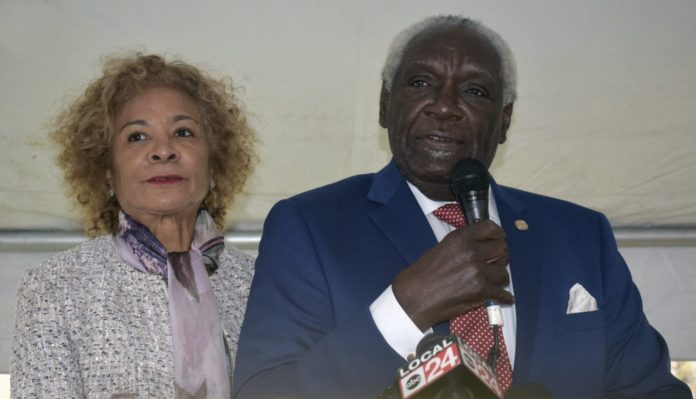
by Dr. L. LaSimba M. Gray Jr., Special to The New Tri-State Defender
The Shelby County Criminal Justice Complex was in dire need of a re-branding. For decades, it was known as the “just us criminal complex.” It was infamously known as simply 201 Poplar, symbolic of disproportionate arrest and incarceration of African Americans in Shelby County.
Last Friday (October 27), the Shelby County Board of Commissioners conducted a name-changing ceremony to honor long time county commissioner and civil-rights lawyer Walter L. Bailey Jr. The ceremony marked the renaming of “201 Poplar” to the Walter L. Bailey Jr. Criminal Justice Complex.
“I believe the honor we pay to Walter Bailey is the least we can do to honor the man who has given life to the fight for civil and human rights,” Commission Chairman Van Turner Jr. said. “We are a better society because of commissioner and attorney Walter Bailey.”
Whenever I learn of a name-changing event of this magnitude, I immediately want to visit the process that led to the honor. In the case of Walter Bailey, he has always represented a quiet force to be reckoned with, listened to and sought out in the time of a crisis. His journey to this honor is more than 52 years long.
The starting point was Baton Rouge, La., where young Walter was a student at Southern University. During the student sit-ins, the picketing of stores and protest marching in Baton Rouge, the powers-to be ordered the university to shut down and required all students to re-enroll. The strategy was to weed out all “trouble makers.” History records that Walter Bailey’s brother, the late Judge D’army Bailey, was denied readmission.
Walter was a star guard on Southern’s football team, prompting concessions to keep him on the team. The compromise involved readmitting him, isolating him from the undergraduates and limiting his influence. The new housing arrangements sent Walter to live with law school students, who encouraged him to take up the pursuit of law.
Upon finishing law school and passing the bar, he returned to Memphis and joined the civil-rights movement. “Through indirection, direction find,” the saying goes.
In 1966, Walter joined in the fight to desegregate the Memphis City Schools system. He represented Dr. Martin L. King Jr. during the 1968 sanitation strike. The collaboration greatly impacted Walter. Dr. King preached that America had many unjust laws that needed to be changed.
In the aftermath of King’s assassination, Walter resolved to seek justice for people that had been violated by these unjust laws – regardless of ethnicity or their social or economic standing.
Such a case presented itself in October of 1974. Memphis Police Department officers were dispatched to 1295 Prospect St. in South Memphis, where a burglary was reported in progress. A suspect bolted out the back door when officers arrived.
Patrolman Elton Hyman spotted Edward Garner, a small-frame teenager, ordering him to halt. Instead, Garner began to scale the fence that enclosed the back yard. Hyman fired a fatal shot into Garner’s head.
When that bullet left the gun of patrolman Hyman, he became judge, jury and executioner. However regretful, Hyman was operating within the law, according to the Constitution of the State of Tennessee.
The case was presented to Bailey by the local chapter of the NAACP. He reasoned that provisions of an unjust law had violated the Constitutional rights of young Garner.
Bailey took the case all the way to the United States Supreme Court and won, making it illegal to shoot a fleeing felon. Hyman became “a spark of courage” on the witness stand, according to Bailey, who said, “Mr. Hyman simply told the truth …without his honesty and clarity in testimony we would have lost that case.”
Hyman testified that at no time did he feel threatened by the suspect; at no time did he feel the suspect was a threat to others in the vicinity. He saw the suspects hands as he was scaling the fence, and it was clear to him that the suspect was unarmed.
“Mr. Hyman has saved thousands of lives,” Bailey has said.
On August 9, 2014, Darren Wilson, an officer with the Ferguson, Mo. Police Department, fatally shot unarmed 18-year-old Michael Brown Jr. Because of Walter Bailey, Wilson had to stand trial for violating Brown’s constitutional rights.
On April 4, 2015, while the nation observed the 47th anniversary of Dr. King’s assassination, North Charleston, S.C. police officer Michael Slager shot and killed Walter Scott, who had been stopped for a non-functioning brake light. Because of Walter Bailey, Slager was found guilty of second-degree murder and obstruction of justice and sentenced to 20 years in prison.
While renaming the infamous “201 Poplar” to the Walter L. Bailey Jr. Criminal Justice Complex is a noble recognition, it remains a mere down payment on the tremendous debt we owe attorney Walter L. Bailey Jr.
Thanks a million, Walter. I sincerely hope you enjoyed the journey that led to the name change.
PERSONAL NOTE: (I hope this account of what really happened in the case of Tennessee vs. Garner will remove a dismal cloud from the life of The Rev. Elton Hyman and his family.)




